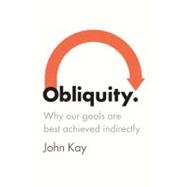
| Preface | p. 1 |
| Obliquity-Why Our Objectives Are Often Best Pursued Indirectly | p. 5 |
| The Oblique World: How Obliquity Surrounds Us | |
| Fulfillment-How the Happiest People Do Not Pursue Happiness | p. 17 |
| THe Profit-Seeking Paradox-How the Most Profitable Companies Are Not the Most Profit Oriented | p. 24 |
| The Art of the Deal-How the Wealthiest People Are Not the Most Materialistic | p. 35 |
| Objectives, Goals and Actions-How the Means Help Us Discover the End | p. 46 |
| The Ubiquity of ObliquitY-How Obliquity Is Relevant to Many Aspects of Our Lives | p. 53 |
| The Need for Obliquity: Why We Often Can't Solve Problems Directly | |
| Muddling Through-Why Oblique Approaches Succeed | p. 67 |
| Pluralism-Why There Is Usually More Than One Answer to a Problem | p. 77 |
| Interaction-Why the Outcome of What We Do Depends on How We Do It | p. 90 |
| Complexity-How the World Is Too Complex for Directness to Be Direct | p. 99 |
| Incompleteness-How We Rarely Know Enough About the Nature of Our Problems | p. 109 |
| Abstraction-Why Models Are Imperfect Descriptions of Reality | p. 116 |
| Coping with Obliquity: How to Solve Problems in a Complex World | |
| The Flickering Lamp of History-How We Mistakenly Infer Design from Outcome | p. 129 |
| The Stockdale Paradox-How We Have Less Freedom of Choice Than We Think | p. 139 |
| The Hedgehog and the Fox-How Good Decision Makers Recognize the Limits of Their Knowledge | p. 144 |
| The Blind Watchmaker-How Adaptation Is Smarter Than We Are | p. 152 |
| Bend It Like Beckham-How We Know More Than We Can Tell | p. 158 |
| Order Without Design-How Complex Outcomes Are Achieved Without Knowledge of an Overall Purpose | p. 165 |
| Very Well Then, I Contradict Myself-How It Is More Important to Be Right Than to Be Consistent | p. 172 |
| Dodgy Dossiers-How Spurious Rationality Is Often Confused with Good Decision Making | p. 179 |
| Conclusions | |
| The Practice of Obliquity-The Advantages of Oblique Decision Making | p. 187 |
| Acknowledgments | p. 197 |
| Notes | p. 199 |
| Bibliography | p. 209 |
| Index | p. 219 |
| Table of Contents provided by Ingram. All Rights Reserved. |
The New copy of this book will include any supplemental materials advertised. Please check the title of the book to determine if it should include any access cards, study guides, lab manuals, CDs, etc.
The Used, Rental and eBook copies of this book are not guaranteed to include any supplemental materials. Typically, only the book itself is included. This is true even if the title states it includes any access cards, study guides, lab manuals, CDs, etc.